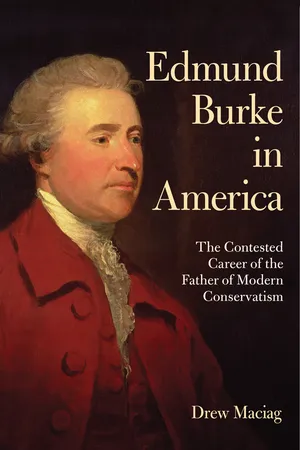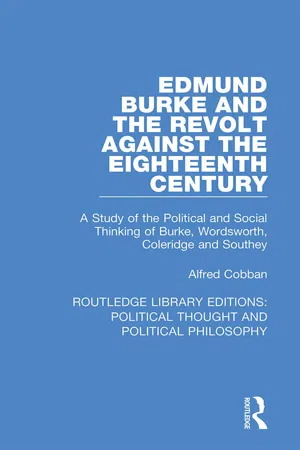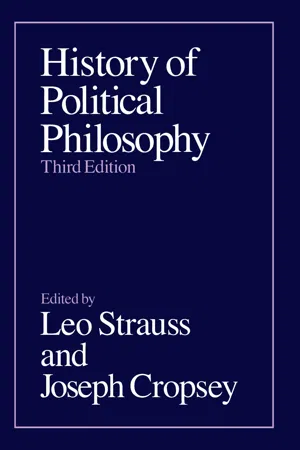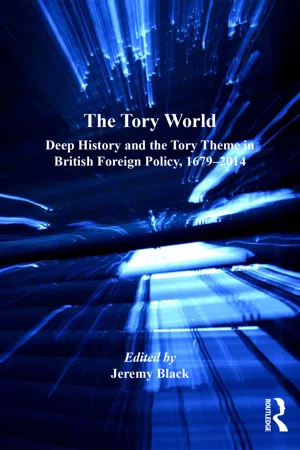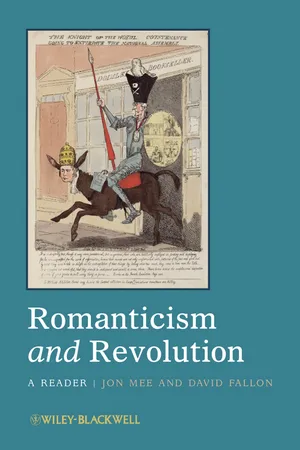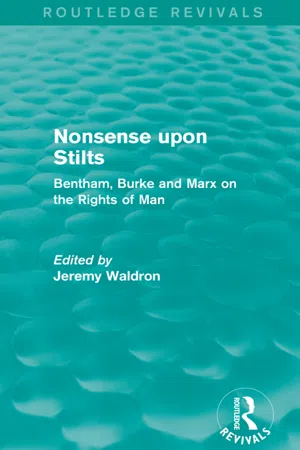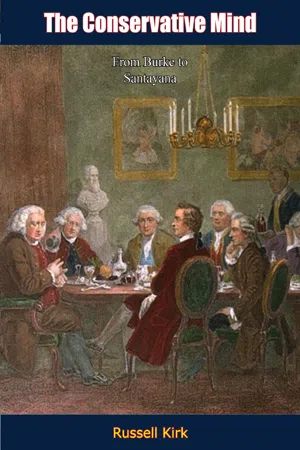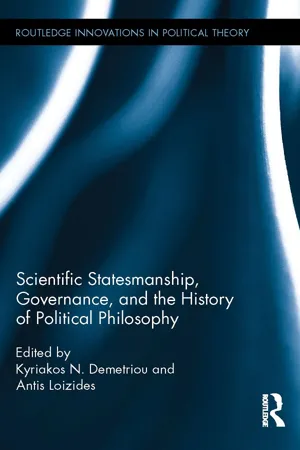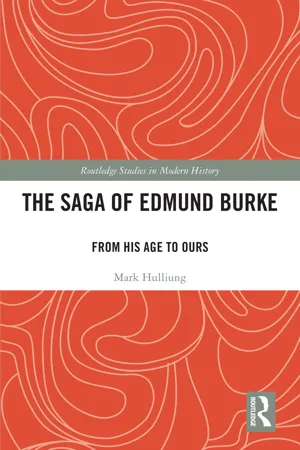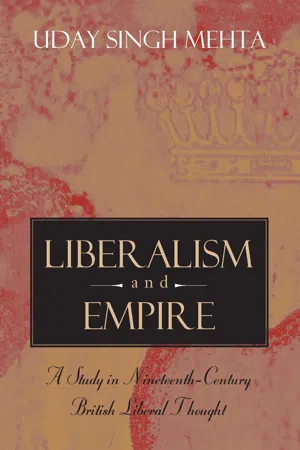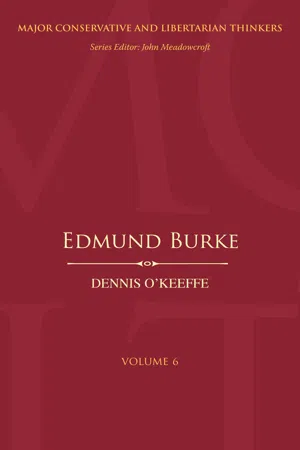Politics & International Relations
Edmund Burke
Edmund Burke was an influential 18th-century Irish statesman, political theorist, and philosopher. He is often regarded as the father of modern conservatism due to his emphasis on tradition, gradual reform, and the importance of preserving established institutions. Burke's writings, particularly his reflections on the French Revolution, continue to shape political thought and have had a lasting impact on conservative ideology.
Written by Perlego with AI-assistance
Related key terms
Related key terms
1 of 4
Related key terms
1 of 3
11 Key excerpts on "Edmund Burke"
- eBook - ePub
Edmund Burke in America
The Contested Career of the Father of Modern Conservatism
- Drew Maciag(Author)
- 2013(Publication Date)
- Cornell University Press(Publisher)
HAPTER 1Burke in Brief
A “Philosophical” Primer
Edmund Burke (1729–97) is usually described as a British political philosopher. But he was, in the first instance, an active politician who spent most of his adult life as a member of Parliament. Whatever “philosophy” Burke expounded was extracted by others from his pamphlets, letters, and orations, which were produced in the heat of political battle. This, in part, explains why he has been susceptible to differing interpretations. Burke was a prolific speaker and writer who today is remembered chiefly as a critic of the French Revolution and as the “father of conservatism.” In historical context, however, he had little in common with many conservatives of his own day, and almost nothing in common with conservatism as it is practiced today. It would be less anachronistic and more accurate to call Burke a progressive-traditionalist instead, since certain kinds of conservatism are antitraditionalist, ahistorical, and certainly not progressive. Burke’s traditionalism employed an idealized conception of the past as a guide for managing change in the present. The goal was not to prevent change; it was to assure the right kind of change.In fact, Burke called for a good deal of change during his lifetime. And far from being a conservative by the standards of his day, he was more the genuine reformer. In British terms, he was a Whig, not a Tory. On such issues as American liberty, the condition of Ireland, religious toleration, the abolition of slavery, and the governance of India, Burke opposed the archconservative power structure and—at considerable political risk—called for more humane policies (in present-day usage, he would have been “liberal” or “progressive” on such issues). Granted, this is not the whole story; on other matters— radical revolution in particular—Burke took the conservative side. But even his conservatism was—and still is—subject to qualification. - eBook - ePub
Edmund Burke and the Revolt Against the Eighteenth Century
A Study of the Political and Social Thinking of Burke, Wordsworth, Coleridge and Southey
- Alfred Cobban(Author)
- 2019(Publication Date)
- Routledge(Publisher)
But there is, if not an interregnum between Locke and Bentham, at least an incipient revolt, represented by Edmund Burke, whose vivid imagination was not to be confined in the rigid categories of Locke, or satisfied by the calculated benevolence of Helvêtius’s school. Our object in this chapter is to attempt to discover in what respects he breaks away from the prevailing attitude towards politics; and this may help us to approach the further question of his conception of the State. Disciple of Locke and Whig politician though Burke was, the real man stands quite apart from the eighteenth century and the philosophes. A believer in antiquity in an age when the Moderns had definitely conquered in their struggle with the Ancients, an adherent of the past in an age that was beginning to look to the future, he was also a philosopher of unreason in the great age of Reason. It was an age that found a mysterious virtue and balm for doubting minds in abstractions and universals—above all in those grand abstractions called Laws of Nature, on which political thinking was still almost entirely based. Burke, on the other hand, denied altogether the validity of abstract, deductive thinking in politics. “Circumstances give every political principle its distinguishing colour”, and he required to have a principle thus embodied, to be able to see the conduct that would flow from it, before he would judge of it. Procrustes, he said, should never provide his ideal of legislation. Universal dicta were never valid in morals or in politics, which were not matters for metaphysical argument but for practical working out - eBook - ePub
- Leo Strauss, Joseph Cropsey, Leo Strauss, Joseph Cropsey(Authors)
- 2012(Publication Date)
- University of Chicago Press(Publisher)
Edmund Burke *1 1729–1797 For almost all his adult life, Burke was a politician; for almost thirty years he was a member of the House of Commons, busy with the affairs of his party in the daily management of men and issues. His speeches, pamphlets, and books sound the grand themes of political philosophy, but not for their own sake. Burke did not primarily address other political philosophers and did not construct a system or theory in political philosophy. He spoke to the rulers and to the educated of his time, supporting “the cause of the Gentlemen,” as King George III once said to him. 1 This closeness to politics has brought Burke to the notice of historians and of conservatives in our day, the former generally disapproving of him, the latter approving. Absorbed as he was, Burke looked at public issues with almost matchless penetration. Among observers of modern politics only Tocqueville and perhaps Churchill are his rivals in seeing the meaning of events. Like Tocqueville and unlike Churchill, Burke did not enjoy the ruling view that an office of command affords. His highest office was Paymaster-General, a dignified secretaryship lacking in glory. Though the ablest in his party, prominent in debate, and influential to the point of indispensable in the management of affairs, he never sought and was never trusted with leadership. He was indeed distrusted by the leading statesmen of his time for the very energy he used in their behalf, for his eagerness to act against dangers of which only he could see and feel the full measure, and for the passion displayed in the gorgeous rhetoric they admired. “Much to admire, and nothing to agree with,” 2 was Pitt’s famous sum mary judgment on Burke’s longer persuasions for counterrevolution against the French Revolution - eBook - ePub
The Tory World
Deep History and the Tory Theme in British Foreign Policy, 1679-2014
- Jeremy Black(Author)
- 2016(Publication Date)
- Routledge(Publisher)
5 Edmund Burke in the Tory World Iain Hampsher-Monk DOI: 10.4324/9781315552156-5What is a chapter about Edmund Burke, that famous Irish Whig, doing in a book on English Toryism? The question is not merely quixotic. Burke was, in important cultural and intellectual ways, Irish;1 and he was of course not only a Whig, but a fierce defender of Whig principles.2 But he has also become, retrospectively, the ‘founder of modern conservatism’,3 a movement and a party that subsequently laid claim to the inheritance – and indeed the name – of the Tory Party that had preceded it. Burke’s own name has been invoked increasingly over the last two centuries by Tories, politicians and conservative thinkers as providing its first, and still perhaps the best theoretical defence of a creed that has largely sought (as did Burke himself) to avoid that awkward partner of political action.41 Connor Cruise O’Brien’s The Great Melody (Chicago, 1992) is the intellectual biography most committed to the Irish dimension of Burke’s political and cultural identity.2 Burke’s Appeal from the New to the Old Whigs (1791) was written to vindicate his position, against that of Fox and those Whigs who flirted with the French revolutionaries, as consistent with that of the original Whigs who supported the revolution of 1688. Modern treatments of Burke tend not to align themselves along an eighteenth-century Whig/Tory divide, But see Frederick Dreyer’s Burke’s Politics: A Study in Whig Orthodoxy (Ontario, [repr.] 2010); and Ian Crowe ‘The Whig Imagination of Edmund Burke’, in Crowe (ed.), Edmund Burke, an Imaginative Whig(Columbia, MO, 2005).3 Most recently, the subtitle of Jesse Norman’s Edmund Burke: The First Conservative - eBook - ePub
Romanticism and Revolution
A Reader
- Jon Mee, David Fallon(Authors)
- 2010(Publication Date)
- Wiley-Blackwell(Publisher)
2 Edmund Burke Reflections on the Revolution in France, and on the Proceedings in Certain Societies in London relative to That Event (London: J. Dodsley, 1790)Born in Dublin to a Protestant attorney and his Catholic wife, Edmund Burke (1729/30–97) was educated as a lawyer at Trinity College, Dublin and then at London’s Middle Temple. He made his first major impact with his treatise on aesthetics A Philosophical Enquiry into the Origin of our Ideas of the Sublime and Beautiful (1757, revised 1759). For Burke, the Sublime is an aesthetic category in which representations of power, immensity, and obscurity stimulate in the observer fear for the self, with an admixture of ‘delight’ produced by aesthetic distance. By contrast, the Beautiful is produced by diminutive, weak, soft, finite, and (as Wollstonecraft would note) feminine objects, generating pleasure and the social passions. Burke uses these categories in Reflections , and his opponents were quick to make reference to his Enquiry in their attacks on Burke’s artifice and on his emotive style.In 1759 Burke became private secretary to William Gerard Hamilton, MP, and began a distinguished political career, forging a reputation as a great parliamentary orator. During the 1760s he also became a fixture in London’s literary circles, including Samuel Johnson’s Literary Club. In 1764 Burke resigned his position under Hamilton and became private secretary to the new prime minister, the Whig Lord Rockingham. This ministry lasted just one year, but Burke’s relationship with Rockingham endured. Burke was a liberal Whig, supporting limitations to the power of the Crown and the people’s right to petition the government, but also resisting more radical reforms. With growing tensions developing between America and the United Kingdom, the Rockingham Whigs sought to defend American liberty and British trading interests. Burke was elected MP for Bristol in 1774 and he made two major speeches on ‘Taxation’ and ‘Conciliation’ over the next year, which supported the American patriots and identified him as a defender of constitutional liberties. Burke opposed the human costs of the war against America and led the Rockingham Whigs’ secession from Parliament in protest. - eBook - ePub
Nonsense upon Stilts (Routledge Revivals)
Bentham, Burke and Marx on the Rights of Man
- Jeremy Waldron(Author)
- 2014(Publication Date)
- Routledge(Publisher)
4 Edmund Burke's Reflections on the Revolution in France DOI: 10.4324/9781315742809-5I
Edmund Burke embodied a category of person he himself regarded as mostthreatening to the established social order – the category of those who hadability but no property. He was born in 1741, the son of an Irish attorney,and studied philosophy at Trinity College, Dublin, and law in London. He wasnot, however, called to the Bar but chose a life devoted to politicalactivity and writing (he published a number of philosophical works includingA Philosophical Inquiry into the Origin of Our Idea of the Sublimeand the Beautiful which had some influence in contemporaryaesthetics). Though his background was humble, he placed his ability, froman early stage, at the service of men of rank and property, becoming privatesecretary to the Marquess of Rockingham, and pursuing a parliamentary careerunder Rockingham’s patronage and with his financial support. Burke was neveruntroubled by money worries and he was always sensitive on the subject ofhis background in a parliament that was still (Burke thought quite properly)dominated by the landed interest.1 His purchase of a house and estate at Beaconsfield in 1768 left himheavily mortgaged for the rest of his life. His brothers were involved inshady financial dealings, and Burke was sufficiently close to them to betainted by their dishonour.2 He held office as paymaster of the forces in the period 1782–4 buthis attempts to reform that office redounded to his own pecuniarydisadvantage. And in 1793 one of Burke’s most eloquent pieces, ‘A Letter toa Noble Lord’, was written as a diatribe against an aristocrat who had daredto oppose a parliamentary proposal to award Burke a pension. It was only inhis final years that he achieved anything like financial security.Apart from his unpropertied background, Burke’s Irish origins contributed tohis feeling himself to be, and being perceived as, an outsider. He rarely visitedIreland after coming to England, but he remained a partisan of Irishinterests. More importantly his Irish background gave him some experience ofa country whose level of development was somewhat lower than England’s andtherefore a sense of how contingent and fragile the achievements ofcivilization were. Conor Cruise O’Brien has aruged that this is the key tothe urgency of Burke’s concern about the contagion of the French Revolution:he was baffled by those in England who thought complacently, ‘It couldn’thappen here.’ As O’Brien puts it, ‘an Irishman could not be so sceptical, orso placid; revolt was in fact imminent in Ireland, and broke out in 1798,the year after Burke’s death.’3 - eBook - ePub
The Conservative Mind
From Burke to Santayana
- Russell Kirk(Author)
- 2020(Publication Date)
- Barakaldo Books(Publisher)
In examining Burke’s conservative system, therefore, it is well to commence on the lofty plane of religious belief. For Burke, the formulas upon which man’s existence rested never had grown hollow. 3 “The Tory has always insisted that, if men would cultivate the individual virtues, social problems would take care of themselves.” So, contemptuously, Granville Hicks once wrote of Robert Louis Stevenson. There is a good deal in this observation, although it is more nearly true of Johnson than of Burke. It is not the whole of Burke’s opinion upon the ills of society, for no one knew better than he the power for good or evil that lies in establishments; but it is true that Burke saw politics as an exercise in morals. And a great part of conservative doctrine on this point comes from Burke. To know the state, first we must know the ethical man, Burke thought. “Rousseau is a moralist, or he is nothing.” After delivering this judgment, Burke rises to an assault upon the Genevese so merciless that one is tempted to add the quip, “and he is not a moralist.” But Burke did not underestimate the Social Contract. Rousseau’s was a false morality, but pretentious; against it must be set a nobler. A new-fangled morality was a monstrous imposture; Burke turned in this matter, as in most, to prescription and precedent, old materials ready to the true reformer’s hand, to supply this opposing morality which might heal the wounds inflicted by revolutionary moral doctrines. The praise of humility was often on Burke’s lips; and in his system of morals, at least, he showed himself a humble man. Disdaining a vain display of invention, he burnished up the arguments of Aristotle and Cicero, of the Fathers of the Church, of Hooker and Milton, and put new warmth into their phrases, so that their ideas flamed above the Jacobin torches. Rejecting the notion of a world subject only to sudden impulse and physical appetite, he expounded the idea of a world governed by strong and subtle purpose - Kyriakos N. Demetriou, Antis Loizides(Authors)
- 2015(Publication Date)
- Routledge(Publisher)
Works , III.85–6). In short, Burke’s political representatives were an aristocratic body constituted by nurture as well as nature. “Statesmen” were a group appropriately limited, in his view, to those with the economic means to cultivate their native talents.Burke deployed these conceptions about statesmanship as the appropriate task of a narrow “natural aristocracy” of representatives to articulate public policy and legislative positions over the long course of his time in office, the vast majority of which was spent in political opposition—quarrelling with other Whig factions, Tories, and King George III and his men. With respect to domestic British politics, Burke fought a two-front battle. On one flank he defended what he saw as the rightful claims of Parliament against the overreaching powers of the Crown, thereby aiming to preserve the “mixed” balance of powers among the King, the House of Lords, and the House of Commons. On the second flank he resisted all attempts to undermine what he saw as the rightful place of the natural aristocracy by making the British electoral system more democratic.For example, Burke spoke passionately against shortening the duration of Parliaments, to prevent political representatives—or statesmen—from having to face their voting public more often. Such a move, which would have marked a significant deepening of public sphere democracy, was anathema to Burke precisely because he regarded large sections of the public as incapable of understanding what was truly in their interest; therefore, as a statesman he believed the suffrage should be exercised only very infrequently. Similarly, throughout his career Burke argued against increasing the number of “actual” representatives in Parliament, because he believed that the natural aristocracy of true statesmen would “virtually” represent all interests by taking their views into account in decisions, even without their direct representation. Likewise, Burke steadfastly resisted any expansion of the suffrage, or even any reform of Britain’s corrupt electoral system of “rotten boroughs.” On Burke’s view, the British institutional system, or constitution, although necessarily imperfect as all human institutions were, had nevertheless “existed time out of mind.” It was a “prescriptive constitution,” an inheritance whose long historical duration was proof enough that it had satisfied basic human needs well. Burke believed that under such circumstances there should always be “a presumption in favor of any settled scheme of government against any untried project.” People should be favorably disposed toward their historical inheritance, because while the individual and the temporary multitude are quite limited in their rationality and often foolish, over the long haul “the species is wise.” Burke therefore saw long-surviving institutions as the best concrete expression of accumulated human wisdom, necessarily limited though it was.17- eBook - ePub
The Saga of Edmund Burke
From His Day to Ours
- Mark Hulliung(Author)
- 2023(Publication Date)
- Routledge(Publisher)
Front and center in their reflections was Bolingbroke, the figure Burke had dismissed with stinging sarcasm in Reflections on the Revolution in France. The many commentators of recent times who have characterized Burke as the hero of an unbroken conservative tradition are therefore mistaken. The nineteenth century is not Burke’s conservative moment. If anything, that period was one in which it was the liberals who repeatedly called out his name and claimed him as their illustrious predecessor. Among the liberals, nothing was more common than to express admiration for the Burke who had been the outstanding Whig spokesperson during the period preceding the French Revolution. And liberals felt forced to remember the Burke of the Reflections when they confronted events in nineteenth-century France, especially in 1830 and 1848. Often, they took pleasure in projecting images of the England of 1688 upon the promising France of 1830, only to express their shock and dismay not many years later when it appeared that the France of 1848 might be a repeat of that country’s 1790s. Burke, who could express both their hopes and their fears, was frequently called upon by liberals in search of a formidable spokesperson. Burke as an Outsider to the Conservative Tradition Burke’s writings in 1796, the year before his death, convinced the Tories of the early nineteenth century to keep their distance from the man who would eventually be known as the hero of conservatism. Mainly, it was the Letters on a Regicide Peace that led Tories to shun and sometimes criticize Burke. A lesser but by no means insignificant problem was his Letter to a Noble Lord, which inadvertently raised questions as to whether he continued to uphold his lifetime commitment to the English aristocracy - eBook - ePub
Liberalism and Empire
A Study in Nineteenth-Century British Liberal Thought
- Uday Singh Mehta(Author)
- 2018(Publication Date)
- University of Chicago Press(Publisher)
Regarding the empire, the relevant questions in the eighteenth and nineteenth centuries were, what were the relationships on which the empire was predicated, and which it fostered, and how were these understood? Did it, for instance, rely on and entrench a worldview in which considerations of blood and essentialized conceptions of national and cultural destinies got braided with the exercise and purported legitimacy of imperial power? Was that power furthermore reliant on a “progressive” view of history in which somehow India, and more generally the East, got coded as ossified and confined in their “traditions” and therefore were “backward” or stunted in a civilizational infancy? Did this conception of historical development underappreciate the coherence of extant lived social forms and thus make them merely unstable stages in the realization of an alleged cosmopolitan moral and political ideal? Did the category “traditional” itself serve to blanket India such that local life forms and institutions were bleached of their coherence, flexibility, and contingency—in short, of their possible vitality? By the nineteenth century virtually all normative theorizing is explicitly grounded in some account of universal history, pace Hegel, Marx, and Mill. For liberals this was obviously a departure from the equally explicit antihistorical orientation of Hobbes and Locke, where the normative foundations rested on an account of human nature that was at least ostensibly indifferent to civilizational accomplishments and cultural values. Finally, do the protagonists of the empire hold to an overly narrow conception of political order that implicitly sanctions imperial interventions by obscuring or distorting alternative extant forms of political order in India?It is these questions that allow the empire to be a mirror on late eighteenth- and nineteenth-century British political thought. And it is through their interrogation that one gets a sense of how familiar liberal concerns with issues of toleration, popular sovereignty, and limits on the exercise of legitimate power got played out under conditions of multifaceted and lived pluralism. These are the very questions that inform Burke’s thinking. More generally, what animates Burke’s views on the empire and his political thought is an alternative understanding regarding the basis of political power and individual and political identity—including the issue of membership—and via these concerns an alternative conception of public interest. It is this alternative understanding that this chapter illustrates and that I contend is at the root of Burke’s prophetic view of the empire.THEORETICAL UNDERPINNINGSBurke was deeply moved by various aspects of Indian social order and civilization, but most particularly his concern centered on India as a site of British political adventure and expansionism. The specific question that this chapter considers is what was the political basis of Burke’s concern for India and, relatedly, what were the grounds for his deep reservations toward British imperial practices in India? Burke’s views on this question are closely linked to his thoughts on political identity, the basis of legitimacy, and the practices through which both can be undermined. It is commonplace to think of these latter issues as best elaborated in Burke’s writings on the excesses of the French Revolution. As an aside, I hope to make clear that for Burke, the British Empire, especially in India, was nothing less than a revolution, with all the psychological naïveté and theoretical arrogance that he associated with the revolution in France. - eBook - ePub
- Dennis O'Keeffe(Author)
- 2013(Publication Date)
- Bloomsbury Academic(Publisher)
Loose and promiscuous attitudinizing, of a kind which brutally extinguishes the past and lays waste the future: such is Burke's fundamental assessment of the developments which he saw in France, developments already boasting converts in England, and which he feared might spread further in his adopted land. His two particular bêtes noires, if readers will forgive the French metaphor, were the prominent rightsologists – as we might call them today, Voltaire and Rousseau. He does not pursue them on grounds solely of practicality, but on grounds of fundamental principle also.Rights exist and are of infinite importance to Burke, since he believes they come from God. In this speech Burke maintains, beyond all question of ambiguity, that' (t)he rights of men – that is to say the natural rights of mankind – are indeed sacred things; and if any public measure is proved mischievously to affect them, the objection ought to be fatal to that measureBurke's Irish Writings: An Unfinished Letter to His Son (179–)Burke was during his lifetime a major influence on 'conservative' thought, those doctrines and theories attempting to build on the successful past history of polities and extend present successes into the future for generations to come. Burke's influence on conservative thinking has since been unquestionably enormous. Despite his undoubted love of his native land and what seem to me his unmistakable Catholic sympathies, however, his impact on Irish affairs was limited in scope. He wrote no books, though there are some fine letters and speeches, brought together first in a famous selection by Matthew Arnold. This was re-issued in 1988 with a new introduction by Conor Cruise O'Brien (Burke 1988).Why though, is there no big Irish book by Burke? What part if any Burke's thinking may have played in the English-speaking world in general today, is a subject to be touched on in Chapter 4. To repeat: it cannot be claimed that his writings much influenced events in Ireland either in or after his lifetime. O'Brien believes that Burke felt guilty about how little overall he had done to relieve the oppression of the Irish. In India he had been much more successful at righting wrongs. His need to compound for Irish failure was transferred to the Indian question (Burke 1988: 336).
Index pages curate the most relevant extracts from our library of academic textbooks. They’ve been created using an in-house natural language model (NLM), each adding context and meaning to key research topics.
Explore more topic indexes
Explore more topic indexes
1 of 6
Explore more topic indexes
1 of 4
